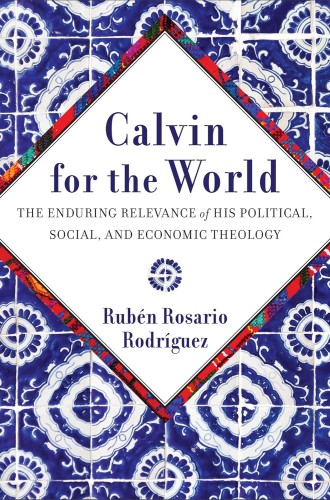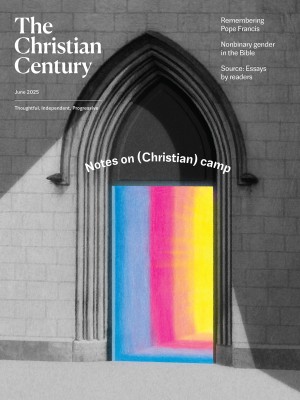Pulling Calvin out of predestination’s shadow
Rubén Rosario Rodríguez makes a case for the Reformer as a resource for justice and advocacy work.

Calvin for the World
The Enduring Relevance of His Political, Social, and Economic Theology
When I was in graduate school, I wryly referred to myself as the most Reformed living human since John Calvin. To my surprise, this assertion did not win me friends or influence people. A cradle Presbyterian, I was startled to find that “Reformed” for my classmates indicated not any kind of blessed assurance in the Providence of God but rather cruelty, caprice, repression, and a total absence of any sense of humor. The problem, of course, was with Calvin’s soteriology, the unavoidable fact of double predestination, which looms so large that it blots out the rest of his writing with its shadow.
Rubén Rosario Rodríguez wants to pull some of that writing out of that shadow. Rodríguez rightly does not touch soteriology, which would only invite a fight and is not material to the points he wishes to make. Rather, he takes Calvin in his context as a migrant, a refugee, a lawyer, and a political operator, mining his writing for potentially surprising relevance to pressing contemporary issues of justice and advocacy. Rodríguez loves Calvin, and this alone is a refreshing change. Calvin for the World introduces Calvin as a serious thinker and generative resource for justice work, taking seriously both Calvin’s limitations and his insights.
Read our latest issue or browse back issues.
This balance sometimes falters under the weight of a desire to color Calvin himself as a relative progressive, which is different from arguing for a reconsideration of his legacy, or indeed from arguing that his thought is valuable in the struggle for justice. Rodríguez’s historical contextualization of Calvin is a much-needed corrective, as the Reformer often bears the brunt of blame for viewpoints and actions more reasonably blamed on most of early modern Europe. (The execution of Michael Servetus is a prime example.) But this desire to correct the record also pushes Rodríguez into a defensive posture that is weaker than his more positive framings.
The chapter on Calvin’s humanist tolerance is particularly hamstrung by this tendency. Pieces of the argument can be paraphrased as “Calvin was not as bad about this problem as many of his contemporaries”—not a compelling reason for turning to Calvin for lessons on tolerance—and the star witness is a paragraph that appears only in the first edition of the Institutes and not thereafter. This defensive framing also appears in the book’s introduction and conclusion, both of which suggest that Calvin, a man of his time, has been a victim of contemporary cancel culture. This does not satisfy, as hatred of Calvin and his theology is centuries old, and “cancel culture” is far too broad a concept—and too frequently invoked in bad faith—to hold weight on its own.
The great majority of Calvin for the World, however, is an achievement: accessible, lively, balanced, historically grounded. Rodríguez is creative and perceptive in his choices of thinkers to put into conversation with Calvin and fields in which to apply his thought. Calvin emerges as thoughtful, principled, and faithful, as well as conservative and dogmatic. Rodríguez demonstrates the pervasive reach of Reformed ideas about the relationship between the church and civil government, their surprising resonance with liberation theology, and the clarity and biblical authority with which they have spoken and can yet speak to the perversions of Christianity that undergird injustice and brutality. In fact, what emerges most clearly is that commitment to the authority of scripture will lead even a person as temperamentally conservative as John Calvin to accept an incontrovertible and unavoidable responsibility to the poor, foreign, and vulnerable; undeniable unity with all humankind; and the ironclad rule that obedience to civil rulers, no matter how paramount, must never lead the Christian to disobey God.
It is this revelation—that assiduous study of scripture leads to saying things like “Therefore, whatever man you meet who needs your aid, you have no reason to refuse to help him” (Institutes 3.7.6), or “How absurd would it be that in satisfying men you should incur the displeasure of him for whose sake you obey men themselves?” (4.20.31)—that rings most loudly in the confusion and turmoil of our present moment. In the United States, the role of the Bible in the formation of morality is controversial because it is claimed by the right wing and the left, the conservative and the liberal church, for diametrically opposed purposes. This is nothing new, Rodríguez shows us, pointing to competing political uses of Christianity and the Reformed tradition in Brazil, El Salvador, and South Africa.
But the temptation to cede scripture and doctrine to the loudest or most violent voices must be resisted. The greatest witness of John Calvin, outlined brightly by Rodríguez, is that of a man who came to his commitments—to sacrificial hospitality, to personal righteousness at great cost, to the responsibility of the church to cry out against governmental abuse—because of his bedrock commitment to scripture, not in spite of it. Calvin cannot emerge as a modern hero; none of the Reformers could. But his spotted life shows the influence of the commands of God on anyone who reads the Bible with determination and humility, and the biblical foundation of his social thought makes it challenging to dismiss him as beholden to one political faction or another.
I would offer that the real plea of this book is not to un-cancel John Calvin, nor to make allowances for him as a man of his times. Rather, it is for something much more difficult and much more fruitful: to take the time to recognize the breadth of his work and to receive from it what is useful while leaving what is not. Jesus says to his disciples that a scribe who has been trained for the kingdom is like someone who takes from among their treasures what is new and what is old. Consider the Calvini opera a storehouse: There is treasure in it for the world.





